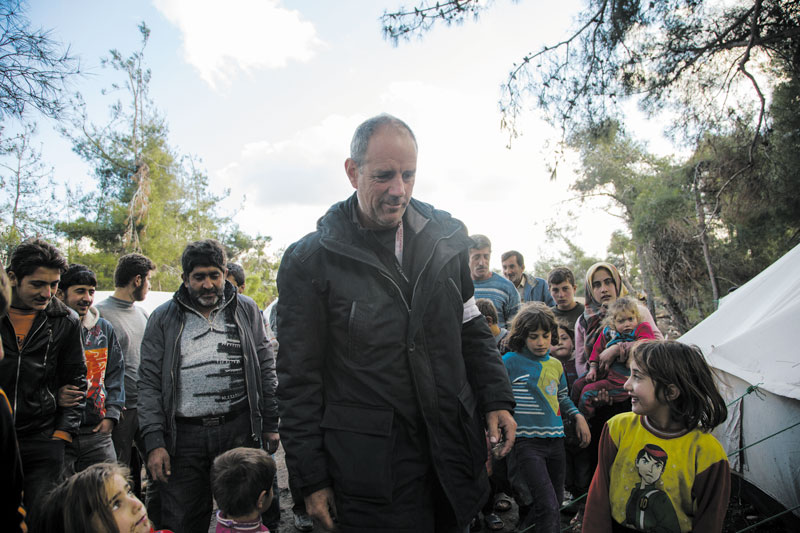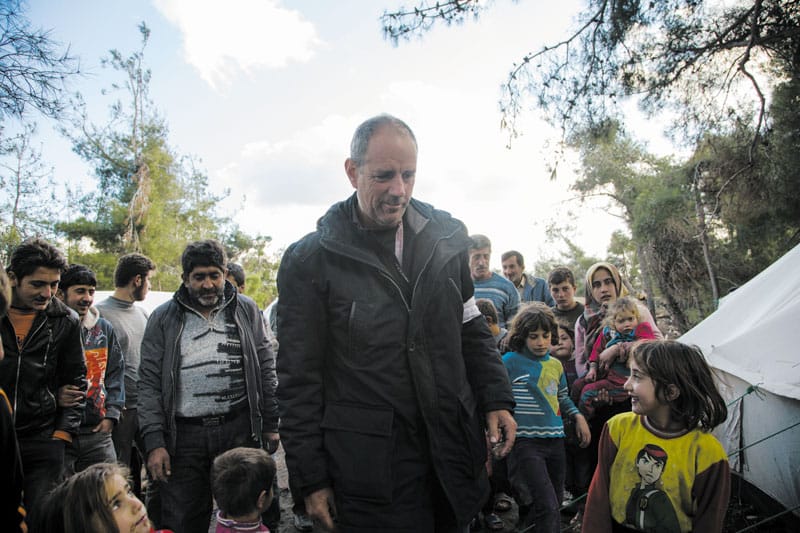John Bunnell, a resident of Bali for nine years, went to war-ravaged Syria as a logistician for two and a half months, working in an undercover field hospital of Médecins Sans Frontières (Doctors Without Border). Here he shares his experiences from the frontline.
Our field hospitals in Syria were ‘undercover’. Initially, we were running a hospital inside a cave, then it was moved into a non-functioning farm—a better location and we could adapt it to reduce the risk of shrapnel or mortar fire. When I got there, the field hospital was already operational, although in a rough way. There were always things that needed improvement and a constant threat that the entire hospital could be moved to another location on short notice. The look of the hospital inside is quite normal, although it was obvious it had to be made operational quickly. The same, old, inflatable operating theatre from the cave was used for sanitary and privacy issues. It also has emergency rooms, inpatient and outpatient departments, a very busy maternity ward, which we expanded, and even a mental health component.
Helicopter drumming and shelling were fairly continuous in the “free” area in which we were working. That being said, the hospital was never targeted, but you could hear the explosions at any time of the day or night; some being far worse than others. MSF was very adamant that every field worker coming to the project completely understood the situation they were getting into. It was an assignment in a war context in its purest form. We had war-wounded coming in fairly regularly, and some big mass casualties just before I arrived. That was our main focus to be prepared for.
I went in as a LAF (Log/Admin/Fin). I found the administrative part of the job to be cumbersome to the rest of my job. There were major changes in human resources (HR) that needed to be done that required a lot of attention. The decision was made to bring in an HR expert to give me some relief; making it possible for me to concentrate on pure logistics. Before the war, Syria was a developed nation, and a lot of our national staff were educated to a fair degree. I was fortunate enough to have the help of some excellent national staff in my department towards the end of my mission.
The actual compound of the hospital is not very big, so it was easy to get around. We also had two rental houses in the valley below, an outpatient department, three mobile clinics and a first-aid post that all needed attention. My duties entailed all aspects of regular MSF logistics, but I was told to focus on communication as a priority when I arrived. Communication was very tricky and too much time was spent in the pursuit of it. I believe this was well-addressed while I was there.
Supply, surprisingly enough, worked out pretty well, relatively speaking. We could get some very simple things from the community—nails, cement, gravel, drums, and basic food items. The majority of medicines and other medical supplies were brought in legitimately through legal border crossings; other more normal items were regularly moved across the border at a variety of crossings using a variety of means. All these required lots of good contacts and networks to ensure that we received the medicines and supplies quickly for the medical team to do their jobs. All of these movements, including the crossing of staff, were some of the most amazing I have seen in my life. Movements and crossings changed by the day and sometimes by the minute. I was amazed at how our staff pulled off these situations on a regular basis!
In Syria, security was also on the top of the list of priorities. We had some unfortunate incidents where people came in with weapons. No one was harmed, but it was disturbing to say the least. This made us quickly look at how this needed to be corrected immediately. It is a basic ground rule of MSF projects worldwide that we will treat anyone who needs medical assistance, including soldiers or rebels, but all weapons must be left outside the MSF facility.
In a war context, there were unavoidable incidents that could jeopardize the security of our staff and patients. Physical changes were made to the hospital at the end of my mission to help solve these important problems. I was mostly involved in the practical aspect of security —training the watchmen, doing physical installations of the entrance to screen the people coming into the hospital and make it a gun-free zone. We set up an entrance where the staff and patients alike are screened before they entered the vicinity of the hospital. There are ‘layers of barriers’ or different stops before you could get inside—there’s one for mass casualty, for patient registration, and for the staff.
Daily security meetings were a key part of our days. The field coordinator and I, together with the medical focal point and security advisor, held daily meetings in the morning followed by another one which involved the whole team. On regular days, we met twice a day. On bad days we had many more! I have never experienced such comprehensive security meetings in any other mission.
The security meetings are not only for staff safety, but also to prepare for what’s going to happen next—when are we expecting an influx of patients, what type of injuries we are expecting, who could work and handle patients’ cases, what’s needed, do we have enough supplies, are there going to be mass casualties or just a handful of wounded people.
It was a very tough assignment because we were in a war. Even though it was one of my best missions ever, it was a very sad and horrible situation for Syria. I would go back if they asked me to, though.





